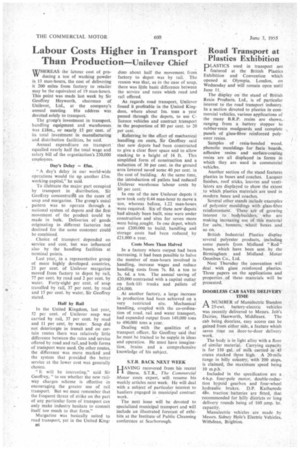Labour Costs Higher in Transport Than Production Unilever Chief W FIEREAS
Page 40

If you've noticed an error in this article please click here to report it so we can fix it.
the labour cost of producing a tort of washing powder is 13 man-hours, the cost of delivering it 200 miles from factory to retailer may be the equivalent of 19 man-hours. This point was made last week by Sir Geoffrey Heyworth, chairman of Unilever, Ltd., at the company's annual meeting His address was devoted solely to transport.
The group's investment in transport, handling equipment and warehouses Was £18m., or nearly 15 per cent. of its total investment in manufacturing and distribution facilities, he said.
Annual expenditure on transport equalled nearly half the total wage and salary bill of the organization's 250,000 employees.
Day's Delay = Om.
"A day's delay in our world-wide operations would tie up another £5m. workingcapital," he said.
To illdtrate the major part occupied by transport in distribution, Sir Geoffrey concentratal on the cases of soap and margarine. The group's usual pattern was to operate through a national system of depots and the first movement of the product Could be made in bulk. Deliveries of goods. originating in different factories but destined for the same customer could be combined.
Choice of transport depended on service and cost, but was influenced also by the handling facilities at terminal points.
Last year, in a representative group of more highly developed countries, 21 per cent. of Unilever margarine moved from factory to depot by rail, 77 per cent. by road and 2 per cent. by water. Forty-eight per cent. of soap travelled by rail, 37 per cent. by road and 15 per cent. by water, Sir Geoffrey stated.
Ralf by Ralf
In the United Kingdom, last year, 52 per cent. of Unilever soap was carried by rail, 37 per cent, by road and 11 per cent, by water. Soap did not deterior3te in transit and on certain routes there was relatively little difference between the rates and service offered by road and rail, and both forms of transport were used. On other routes, the difference was more marked and the system that provided the better service at the lower cost was generally chosen.
" It will be interesting." said Sir Geoffrey, "to see whether the new railway charges scheme is effective in encouraging the greater use of rail transport. But we must remember that the frequent threat of strike on the part of any particular form of transport can only make industry hesitate to commit itself too much to that form."
Margarine was basically suited to road transport, yet in the United King136 dom about half the movement from factory to depot was by rail. The reason was that, as in the case of soap, there was little basic difference between the service and rates which road and rail offered.
As regards road transport, Unilever found it profitable in the United Kingdom, where about Im tons a year passed through the depots, to use Clicence vehicles and contract transport in the proportion of 80 per cent. to 20 per cent.
Referring to the effect of mechanical handling on costs. Sir Geoffrey said that new depots had been constructed to give a clear floor space and to allow stacking to a height of 16 ft. This simplified form of construction and a reduction of 30 per cent. in the ground area covered saved some 40 per cent. in the cost of building. At the same time, the introduction of pallets had reduced Unilever warehouse labour costs by 60 per cent.
In one of the new Unilever depots it now took only 0.44 man-hour to move a ton, whereas before, I.22 man-hours were required. Six of these new depots had already been built, nine were under construction and sites for seven more were being,sought. In one depot, which cost £200,000 to build, handling and storage costs had been reduced by £2L000 a year.
Costs More Than Halved
In a factory where output had been increasing, it had been possible to halve the number of man-hours involved in handling, increase wages and reduce handling costs from 7s. gd. a ton to 3s. 6d. a ton. The annual saving of £20,000 contrasted with a capital outlay on fork-lift trucks and pallets of £24,000.
At another factory, a large increase in production had been achieved on a very restricted site. Mechanical handling, coupled with the co-ordination of road, rail and water transport, had expanded output from 149,000 tons to 490.000 tons a year.
Dealing with the qualities of a transport officer, Sir Geoffrey said that he must be trained to be supple in ideas and operation. He must have imagination, brains and a comprehensive knowledge of his subject.
S.T.R. BACK NEXT WEEK
HAVING recovered from his recent I I illness, S.T.R., The Commercial Motor costs expert, will resume his weekly articles next week. He will deal with a subject of particular interest to hauliers engaged in municipal contract work.
The next issue will be devoted to specialized municipal transport and will include an illustrated forecast of exhibits at the Institute of Public Cleansing conference at Scarborough.




































































































